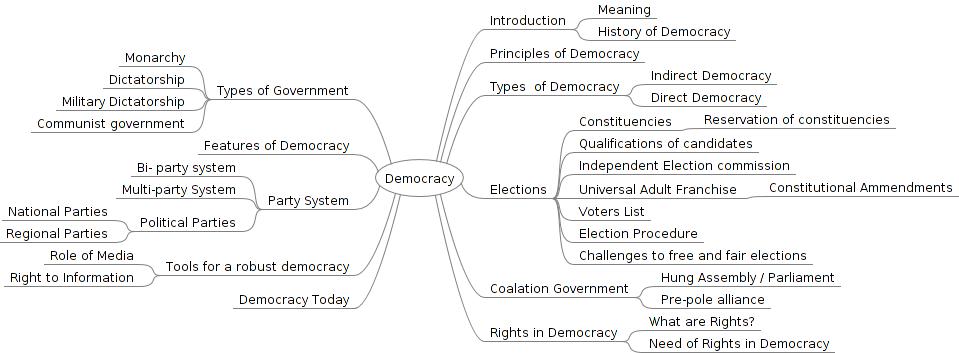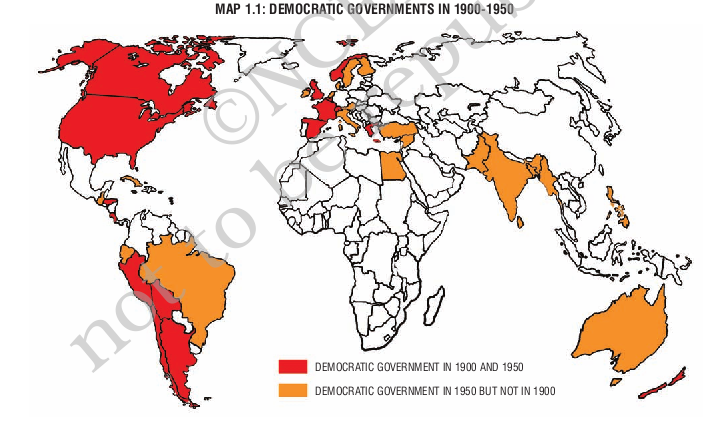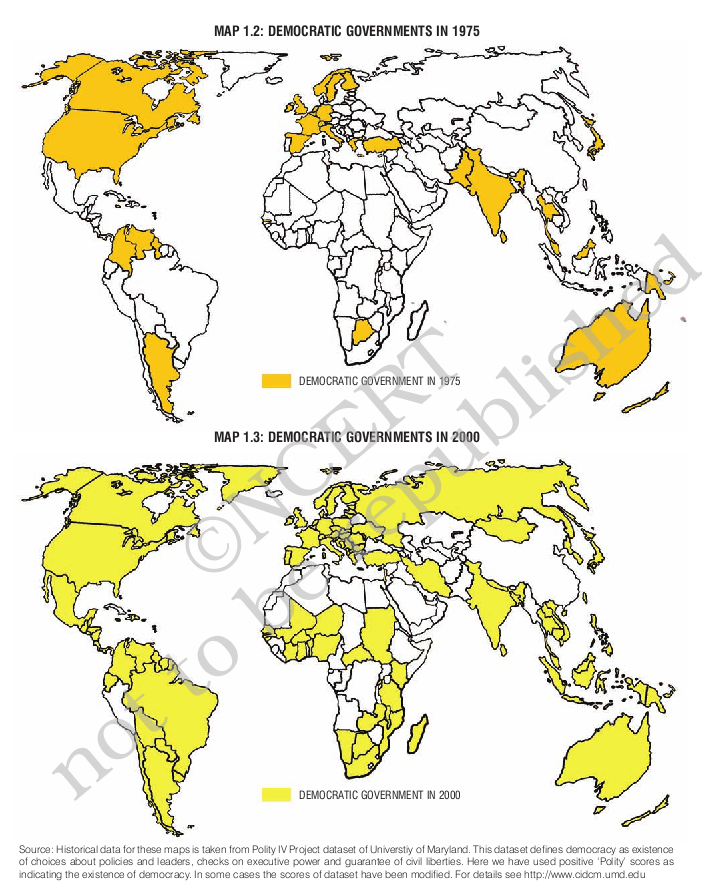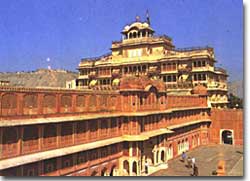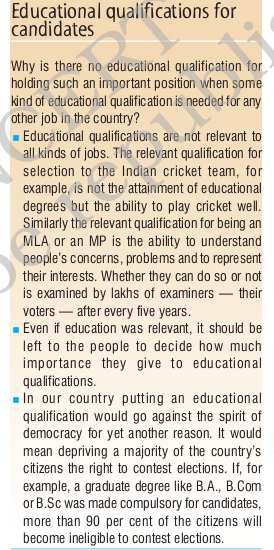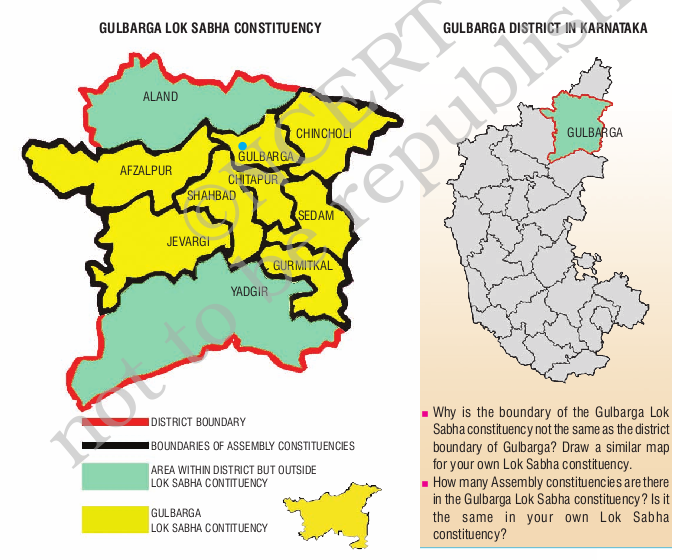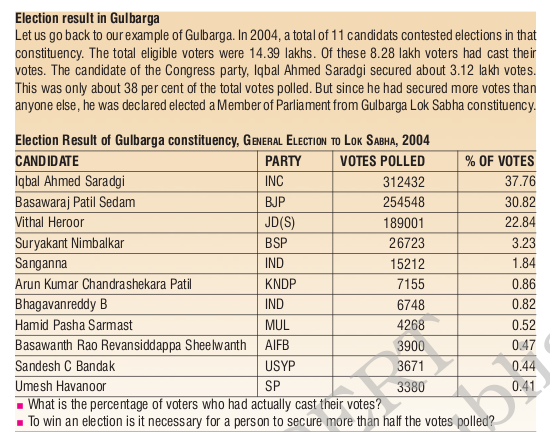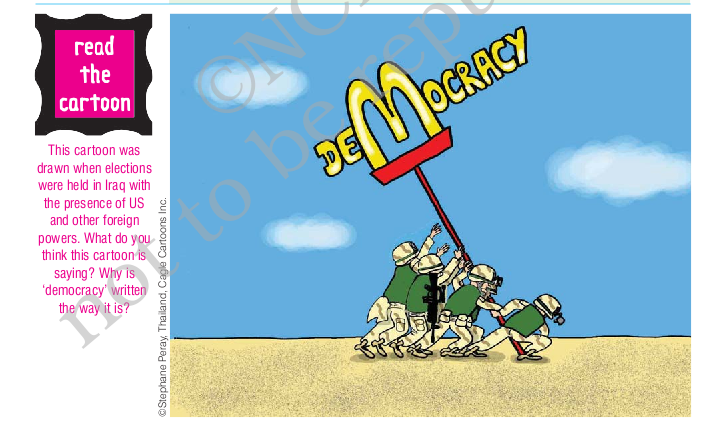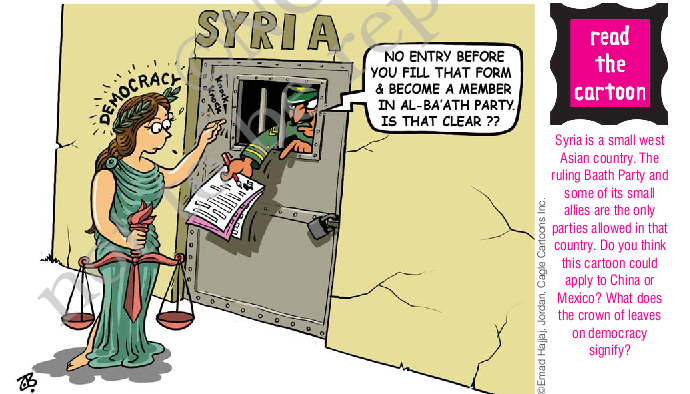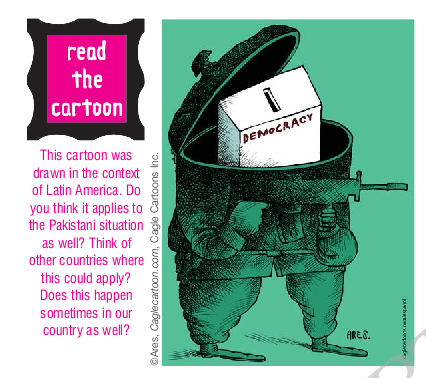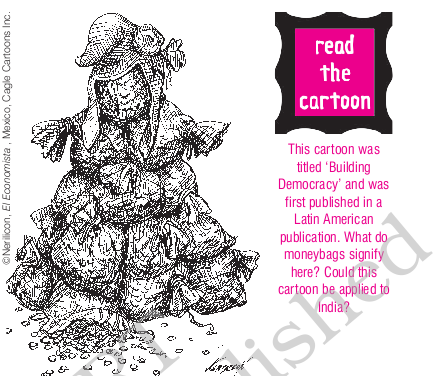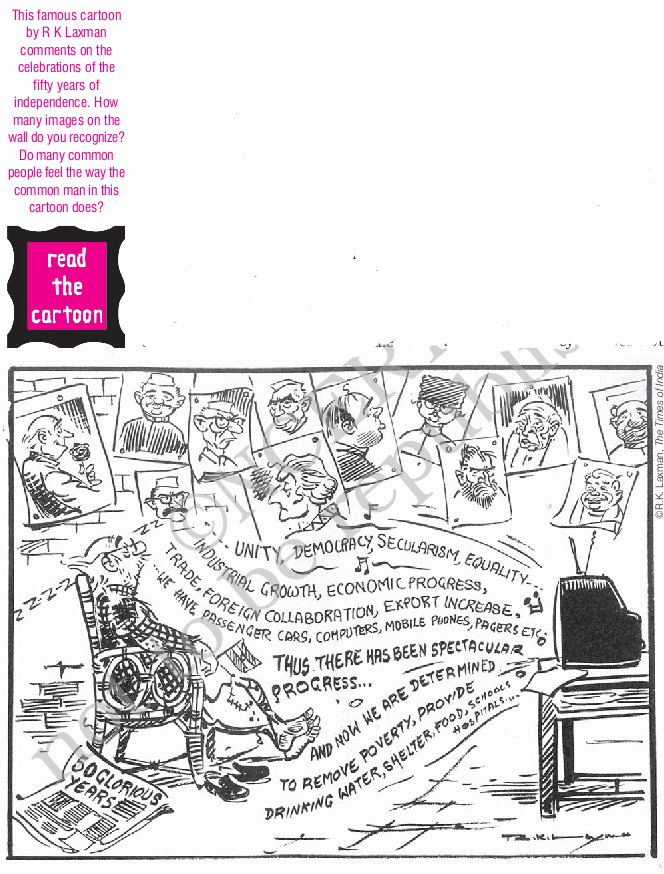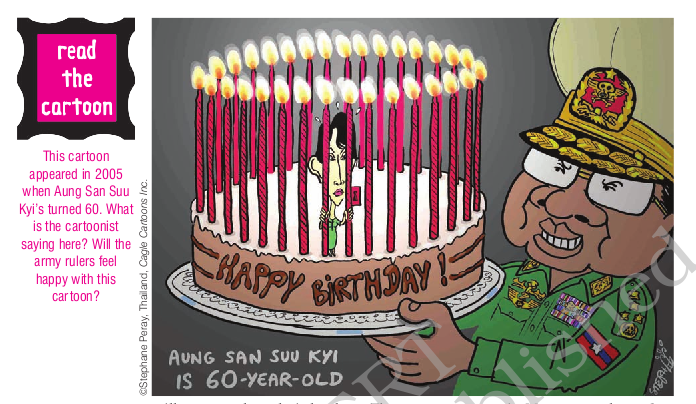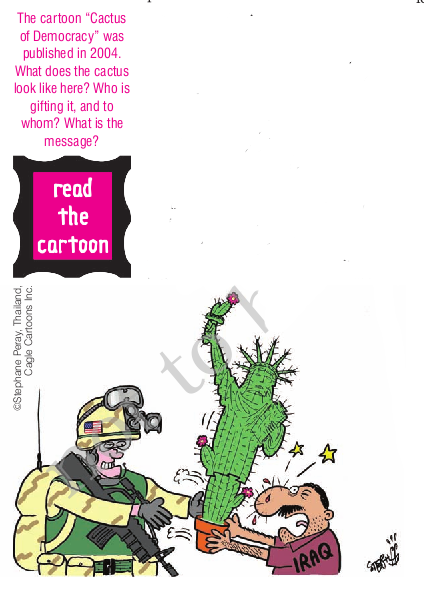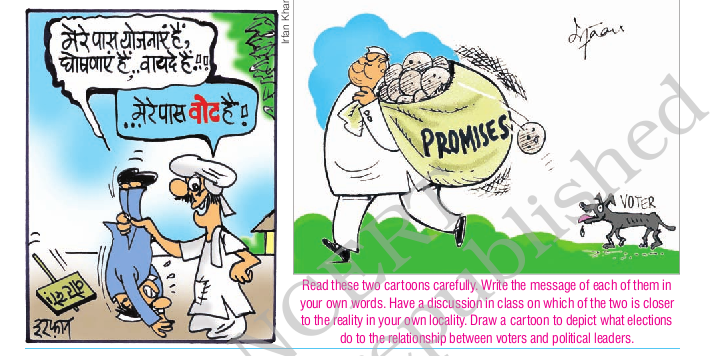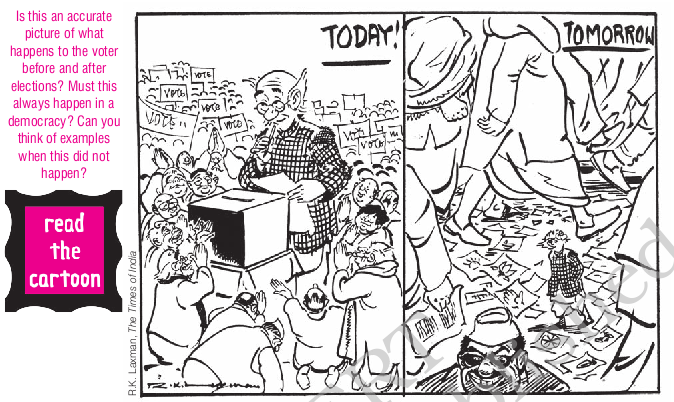Democracy
Introduction
A good citizen actively organizes with other people to address causes of injustice and suffering. A good citizen understands the complexities of social, political, and economic issues and sees how they are interrelated and mutually reinforcing. A good citizen questions accepted definitions of problems. Good citizens are activists who are empowered to focus on things that they care about in their own lives and who can either identify or build the potential avenues needed to truly change them.
Just as English education is not about grammar — except as a vehicle for clarity in writing and thought — democracy education is not solely about how a bill becomes a law; it is also about how students can understand that process and then put it into action to change the world around them. In the same way that far too many English classes focus on diagrams of sentences, too many government classes focus solely on diagrams showing the classic s e p a ration of powers, the branches of government, and h ow a bill becomes a law. Of course, it is important to understand how the mechanisms of our democracy work. When the analysis stops there, we become deeply concerned. Students will only be truly empowered by their understandings of democracy when they can move beyond the diagrams and apply their knowledge in the real world of political action and social change.
It is tempting to believe that teachers, working together with common purpose, can turn students into empowered and active citizens. However, we know that it is not possible for teachers and students to learn, understand, focus, organize, and then right wrongs. When society tells teachers that it is our responsibility to pursue these lofty goals with our students, we are all missing the larger picture. Society must stop pinning its hopes and aspirations for social change primarily on schools. Schools alone have never been and will never be able to cure the broader ills of the social, political, and economic system. Society must acknowledge that real opportunities do not exist for all. Then we must decide collectively that all of us will work to build those opportunities. Until we see increased interest, accompanying public dialogue, massive reorientation of values and priorities, and a resultant groundswell of public action, we will not be particularly hopeful that changes in the distribution of opportunities at all levels will occur.
Presentation on "Introduction to Democracy"
Objectives
- Fostering in the nation’s young the skills, dispositions, and knowledge necessary for effective participation in a social and political democracy;
• Ensuring that the young have access to those understandings and skills required for satisfying and responsible lives;
- Young people need to be taught to make democracy work, to engage civically, socially, and politically.
- To encourage and challenge society to start functioning as a true democracy.
- To develop in students an understanding of the differences in values, interests, priorities, and opinions that exist in a diverse society such as ours. The differences that exist are normal in a democracy and should be respected, not regretted.
- To develop in students familiarity with different methods used in settling conflicts among values, interests, priorities, and opinions in our democracy.
- To develop in students an awareness that differences among people and deliberation, compromise, and voting exist not only in contemporary political life.
Concept Map
Concept Development
Meaning of Democracy
Objectives :
- To understand the different meanings attached to the word democracy
- To come up with one's own definition of democracy
- To know the different definitions of democracy given by different political scientists.
- To understand how history of democracy has developed
Democracy has become a way of life. It is not just about documents or
governments, yet it is about the things people do every day that
contribute to society and make it a better place to live. People's
day-to-day actions that create the democratic way of life. In true
democratic fashion, it invites people to join the discussion and
share their own experiences as citizens. Democracy
is a form of government in which the rulers are elected by the
people. But this does not mean that every government that holds an
election is democratic.
Democracy
is by far the most challenging form of government- both for
politicians and for the people. The term democracy comes from
the Greek language and means "rule by the (simple) people".
It basically means that the rulers are elected by the people.
If you look into newspapers everyday, you will find a lot of articles
about democracy. Do they all explain it in the same manner? What are
the different ways in which democracy is explained and represented?
ಚಟುವಟಿಕೆ
ದಿನಪತ್ರಿಕೆಗಳಲ್ಲಿನ
ಲೇಖನ ಓದಿ ಪ್ರಾಜಾಪ್ರಭುತ್ವದ
ಅರ್ಥವನ್ನು ಕಂಡುಕೊಳ್ಳುವುದು
ಉದ್ದೇಶ -
ಪ್ರಜಾಪ್ರಭುತ್ವದ
ಅರ್ಥ ಮತ್ತು ವ್ಯಾಖಾನೆಯನ್ನು
ಅರಿಯುವುದು
ಬೇಕಾಗುವ
ಸಾಮಗ್ರಿಗಳು -
ದಿನಪತ್ರಿಕೆಗಳಲ್ಲಿನ
ವಿವಿಧ ಲೇಖನಗಳು (
ಹಕ್ಕು
ಸಂಬಂಧ ಹೋರಾಟಾ,
ಹಕ್ಕು
,
ಶೋಷಣೆ,
ಹೀಗೆ
ಹಲವು ಲೇಖನಗಳು )
ಸೂಚನೆ -
ಕೆಲವು
ಸೂಕ್ತ ಲೇಖನಗಳನ್ನು ಶಿಕ್ಷರೇ
ಆಯ್ದು ತೆಗೆದಿಟ್ಟಿರುವುದು,
ವಿಧಾನ
– ಮಕ್ಕಳಿಗೆ ಹಕ್ಕು ಸಂಬಂಧ ಹೋರಾಟ,
ಹಕ್ಕು
,
ಶೋಷಣೆ,
ಸಾಮಜಿಕ
ಘರ್ಷಣೆ,
ಹೀಗೆ
ಹಲವು ಲೇಖನಗಳನ್ನು ಗುರು ಕತ್ತರಿಸಿ
ಇಡಲು ಹೇಳುವುದು.
ಸೂಕ್ತವಾದ
ದಿನದಂದು ಮಕ್ಕಳಿಗೆ ತಾವು
ಕೂಡಿಟ್ಟಿರುವ ಲೇಖನಗಳನ್ನು ತರಲು
ಹೇಳುವುದು.
ಮಕ್ಕಳನ್ನು
ಗುಂಪುಗಳಲ್ಲಿ ವಿಂಗಡಿಸಿ ಚರ್ಚಿಸಲು
ಹೇಳುವುದು
ಆಯ್ದ
ಲೇಖನಗಳನ್ನು ತರಗತಿಯಲ್ಲಿ ಓದಿ
ಅವುಗಳ ಬಗ್ಗೆ ಒಟ್ತಾಗಿ ಚರ್ಚಿಸುವುದು
ಚರ್ಚಾ ವಿಷಯ - ಯಾವ ಸಂದರ್ಭದಲ್ಲಿ ಪ್ರಜಾಪ್ರಭುತ್ವದ ಪಾಲನೆಯಾಗಿದೆ.
ಪ್ರಜಾಪ್ರಭುತ್ವಕ್ಕೆ
ಧಕ್ಕೆಯಾದ ಸಂದರ್ಭ,
ಅಂಥ
ಸಂದರ್ಭದಲ್ಲಿ ಸಾಮಾಜಿಕ ನ್ಯಾಯದ
ಸ್ಥುತ್ಗತಿ,
ಅದನ್ನು
ಕಲಿಕಾಂಶ -
|
Definitions of Democracy
|
History of Democracy
Democracy in ancient times
Around 2500 years ago in Ancient Greece, the people of the city-state of Athens developed a way of making decisions that was different from the autocratic ways of the past. An autocratic system of government is a type of government where one person or small group make all the decisions on behalf of the people of the state. Citizens of the state have no say in influencing decisions.
Ancient Greece
Athens was the first city state to allow ordinary citizens access to government offices and courts. In theory, all Athenian citizens were eligible to speak and vote in the Assembly which set the laws of the city-state. In reality, Athens was not a true democracy as women were not included nor were foreigners, slaves or freed slaves. Also, according to the rules of citizenship both parents must have been Athenian citizens for a person to qualify to take part in the Assembly. The democracy therefore, was only a very small minority of the people living in Athens. It was, however, the closest any country had come to establishing a democratic society at this time.
Democracy in the Middle Ages
The Middle Ages was a period of European history from the fall of the Roman Empire (476 AD) until the fall of Constantinople in 1453 AD. Although there was not a democracy directly in place during the Middle Ages, Christianity was widely followed and so many democratic ideas were understood and followed by many of the people. Christianity taught that all men were created equal. Another form of government, known as feudalism developed during this time. Feudalism stressed that all people had certain rights and developed a system of courts to defend these rights.
In
medieval England, in 1215, King John had total control and his
subjects had no freedom or say whatsoever. The Magna Carta took some
of the king's power away and gave some rights and freedom to the
people.
The
American Revolution is an important event in history that marks a
turning point in democracy. The first step was the creation of the
Declaration
of Independence,
written by the American President, Thomas Jefferson in 1776. In this
document many ideas were taken from two famous philosophers of the
time, Jean Jacques Rousseau and John Locke, which outlined freedom
and equality.
ಚಟುವಟಿಕೆ
'-
ಪ್ರಜಾಪ್ರಭುತ್ವದ
ಇತಿಹಾಸವನ್ನು ಅರಿಯುವುದು
ಉದ್ದೇಶ - ಪ್ರಜಾಪ್ರಭುತ್ವದ
ನಕಾಶೆಯನ್ನು
ಬೇಕಾಗುವ
ಸಾಮಗ್ರಿ - ಪ್ರಜಾಪ್ರಭುತ್ವದ
ಐತಿಹಾಸಿಕ ನಕಾಶೆಯನ್ನು ನೋಡಿ
ಅದರ ಬಗ್ಗೆ ಚರ್ಚಿಸುವುದು.
ಸೂಚನೆ - NCERT / ಬೇರೆಡೆ
ಲಭ್ಯವಿರುವ ನಕಾಶೆಗಳನ್ನು
ತಯಾರಿಡುವುದು.
ಇವುಗಳನ್ನು
projector ಮೂಲಕ
/ ಪ್ರತಿಗಳನ್ನು
ಹಂಚಬೇಕೋ ಇಂಬುದನ್ನು ಮೊದಲೇ
ನಿರ್ಧಾರ ಮಾಡಿ ಅದಕ್ಕೆ ಬೇಕದ
ತಯಾರಿ ಮಾಡುವುದು .
ವಿಧಾನ
– ಒಂದೊಂದಾಗಿ ನಾಕಾಶೆಗಳನ್ನು
ಸೂಕ್ಷ್ಮವಾಗಿ ಗಮನಿಸಿ,
ಚರ್ಚಾವಿಷಯ
- ಇತ್ತೀಚೆಗೆ
ಪ್ರಜಾಪಭುತ್ವ ಪಡೆದುಕೊಂಡಂತಹ
ರಾಷ್ತ್ರಗಳನ್ನು ಗುರುತಿಸುವುದು
ಆ ರಾಷ್ತ್ರಗಳು
ಹೇಗೆ ಪ್ರಜಾಪ್ರಭುತ್ವವನ್ನು
ಪಡೆದುಕೊಂಡವು ಎಂಬುದರ ಬಗ್ಗೆ
ಚರ್ಚೆ.
ಆದರ ಅವಶ್ಯ್ಕತೆ
ಏಕಿತ್ತೆಂಬುದರ ಮೇಲೆ ಚರ್ಚ್
Modern democracies
Modern democracies developed throughout the 20th century. Democracies have resulted from wars, revolutions, decolonisation and economic circumstances. The number of democracies continues to grow and it has been speculated that this trend may continue in the future to the point where democratic nation-states become the standard form of human society. The most common form of democracy in today's world is rule through peoples' elected representatives.
Activity
Look at the different historical maps of democracy from the ncert texts.
Which
countries initially having a democratic form of government.
Choose
2 new countries which have got democracy recently. Find out how they
achieved this?
Self Evaluation
Evaluation for the Theme
Types of Democracy
Objectives:
- To distinguish between the types of democracy
- To understand the relationship between the types of government and democracy.
Direct democracy or Pure democracy -
- a political system in which the citizens vote directly in matters of public concern; every citizen participates in decision-making. It is a form of democracy in which the people as a whole make direct decisions, rather than have those decisions made for them by elected representatives. For example, in a decision making of electing or dismissing someone, it has to be done by all participations and signatures, or this kind of measure will not work.
Representative democracy -
- a form of government in which people elect representatives to rule in their interest; citizens participate in elections and select people to carry out government. It is a type of democracy in which the citizens delegate authority to elected representatives. For instance, when it is required to make a decision to promote someone in the organization, the people will give all the authority to the elected representative to decide whether he or she will be promoted or not.
Types of Governments
Monarchy: Government by a monarch. A state ruled or headed by a monarch. Undivided sovereignty or rule by a single person, who is the permanent head of state. The term is now used to refer to countries with hereditary sovereigns. Monarchy Government by a single ruler (king/queen, emperor)
Dictatorship: The office or tenure of a dictator. A state or government under dictatorial rule. Absolute or despotic control or power. Modern dictators usually use force or fraud to gain power and then keep it through intimidation, terror, suppression of civil liberties, and control of the mass media.
Communist government : A system of government where the government plans and controls the economy. Also all citizens are deemed equal. A communist state is a sovereign state with a form of government characterized by single-party rule or dominant-party rule of a communist party and a professed allegiance to a communist ideology as the guiding principle of the state. In a true communist state you give what you can to the state for distribution, keeping only that required to satisfy your needs.
Military Dictatorship : Administration of territory by an occupying power. The definition does not cover military forces stationed in neutral or friendly territory that share administrative responsibilities with local civil authorities. Military government must also be distinguished from military law and martial law. Its control lasts until it either gives up power voluntarily or is overthrown. The term is popularly used for rule of a country by its own military, whether it comes to power through the legitimate governing body.
Activity
Debate on democracy vs dictatorship
Learning
Objectives: 1. To understand
the amount freedom in Democracy
2.To
understand the merits of Democracy.
Evaluation: -
Rights in Democracy
Rights are legal, social, or ethical principles of freedom or entitlement; that is, rights are the fundamental normative rules about what is allowed of people or owed to people, according to some legal system, social convention, or ethical theory. Rights are of essential importance in such disciplines as law and ethics, especially theories of justice and deontology.
Need of Rights in Democracy
(Sourced from NCERT textbooks)
Rights
are necessary for the very sustenance of a democracy. In a democracy
every citizen has to have the right to vote and the right to be
elected to government. For democratic elections to take place it is
necessary that citizens should have the right to express their
opinion, form political parties and take part in political
activities. Rights also perform a very special role in a democracy.
Rights protect minorities from the oppression of majority. They
ensure that the majority cannot do whatever it likes. Rights are
guarantees which can be used when things go wrong. Things may go
wrong when some citizens may wish to take away the rights of others.
This usually happens when those in majority want to dominate those in
minority. The government
should
protect the citizens’ rights in such a situation. But sometimes
elected governments may not protect or may even attack the rights of
their own citizens. That is why some rights need to be placed higher
than the government, so that the government cannot violate these. In
most democracies the basic rights of the citizen are written down in
the
constitution.
Democracy and Caste
|
|
|
The City Palace is the elegant home to Jaipur's Royal Family. While the Maharaj's authority is not recognized by the Indian government, his social status has afforded him business and political opportunities that are not available to the lower classes.
|
Even though India is a
democracy, the social stratification inherent in the Hindu religion persists to this day. Most politicians come from the upper castes, although there has been gradual change in recent years. Still, most people continue to work in the jobs assigned to their castes — jobs their distant ancestors also worked. One result of this stratification is that the wealthiest Indians are some of the richest people in the world — owning palaces, fleets of luxury cars, jewels, and very big bank accounts. At the same time, the vast majority of Indians suffer extreme poverty. Even finding enough food to get from one day to the next can be a struggle.
In
just over 50 years, India has gone from being a British colony to
being a functioning, independent democracy. It still faces problems.
Overpopulation, poverty, and internal strife threaten Indian
stability from time to time. Despite these concerns though, the
world's largest democracy has survived the past half-century without
a government collapse or military takeover.
ಚಟುವಟಿಕೆ
ಪ್ರಜಾಪ್ರಭುತ್ವದಲ್ಲಿ
ಹಕ್ಕಿನ ಪಾತ್ರ
ಉದ್ದೇಶ
-
ಸಮಾಜದಲ್ಲಿ
ವಿವಿಧ ಜಾತಿ ಜನಾಂಗದವರ ಹಕ್ಕಿ
ಉಲ್ಲಂಘನೆಯ ಬಗ್ಗೆ ಚರ್ಚೆ
ಸಾಮಗ್ರಿಗಳು - projector, lap top ಮತ್ತು India Untouched ನ ಆಯ್ದ ಭಾಗ
ಸೂಚನೆ - India Untouched ನ್ನು ಶಿಕ್ಷಕರು ಮೊದಲೇ ವೀಕ್ಷಿಸಿ, ಅದರಿಂದ ಕೆಲವು ಭಾಗವನ್ನು ಆಯ್ದು ಅದಕ್ಕೆ ಕನ್ನಡ ಅನುವಾದ ಮಾಡಿಟ್ಟು ಕೊಂಡಿರಬೇಕು
ಅದೇ
ವಿಷಯಕ್ಕೆ ಸೂಕ್ತ ವೆನಿಸುವ ಕಿರು
ಚಿತ್ರವನ್ನು ಆಯ್ದು ಕೊಂಡಿರಬೇಕು
ಮಕ್ಕಳಿಗೆ
ಸೂಚನೆ -
ವಿಧಾನ - ತರಗತಿಯಲ್ಲಿ ಎಲ್ಲಾ ಮಕ್ಕಳು ವಿಡಿಯೋ ತುಣುಕನ್ನು ನೋಡಲು ಅನುವು ಮಾಡಿಕೊಡುವುದು.
ವಿಡಿಯೋ
ನೋಡಿದ ನಂತರ ಆ ಚಿತ್ರದ ಬಗ್ಗೆ
ತಮ್ಮ ಅನಿಸಿಕೆ ಬಅರೆಯಲು ಸ್ವಲ್ಪ
ಕಾಲ ಅವಕಾಶ ಮಾಡಿಕೊಡುವುದು.
ಅನಂತರ
ಅದರ ಬಗ್ಗೆ ಮುಕ್ತ ಚರ್ಚೆ ಮಾಡಲು
ಹೇಳುವುದು
ಚರ್ಚಾ ವಿಷಯ – ವಿಡೀಯೋ ನಲ್ಲಿ ಅವರು ಕಂಡಂತಹ ಮುಖ್ಯ ಘಟನೆಗಳನ್ನು ಇವರಿಸುವುದು ಮತ್ತು ಅದರ ಬಗ್ಗೆ ಅವರ ಅಭಿಪ್ರಾಯ
ಇಂಥ
ಸನ್ನಿವೇಶಳು ತಮ್ಮ ಸುತ್ತಮುತ್ತಲು
ಗಮನಿಸಿದ್ದರೆ ಅದರ ಬಗ್ಗೆ ಅವರ
ಅಭಿಪ್ರಾಯ.
( ಬಹಳ
ಸೂಕ್ಷ್ಮ ಷಯವಾಗಿರುವುದರಿಂದ,
ಬಹಳ
ಎಚ್ಚರಿಕೆಇಂದ ಚರ್ಚೆಯನ್ನು
ನಡೆಸಿಕೊಡುವುದು )
ಕಲಿಕಾಂಶ
-
ಚಟುವಟಿಕೆ -
ಉದ್ದೇಶ
- ಲಿಂಗ
ತಾರತಮ್ಯದ ಬಗ್ಗೆ ಚರ್ಚೆ
ಸಾಮಗ್ರಿ
-
NCERT ಪಠ್ಯ
ಪುಸ್ತಕ ದಲ್ಲಿನ ಚಿತ್ರದ ಪ್ರತಿ,(
ಮನೆಯಲ್ಲಿ
ತಂದೆ ಅಥವ ಗಂಡು ಮಗು ಸಹ ಹೆಣ್ಣು
ಮಕ್ಕಳಂತೆ ಕಸ ಗುಡಿಸುತ್ತಿರುವುದ್,
ಅದುಗೆ
ಮಾಡುತ್ತಿರುವುದು )
ವಿಧಾನ
– ಆ ಚಿತ್ರದಲ್ಲಿ ಏನನ್ನು ಗಮನಿಸಿದರು
ಎಂ ಬುದರ ಪಟ್ಟಿ ಮಾಡುವುದು.
ಚರ್ಚಾ
ವಿಷಯ -
ಯಾವುದು
ನೈಜ ವೆನಿಸುತ್ತದೆ,
ಯಾವುದು
ವಿಚಿತ್ರವೆನಿಸುತ್ತದೆ.
ಏಕೆ
ಹಾಗೆನಿಸುವುದು.
ಅದು
ಸರಿಯೆ .
ಕಲಿಕಾಂಶ
– ಎಲ್ಲಾ ಕೆಲಸಗಳನ್ನು ಯಾರಾದರು
ಮಾಡಬಹುದು,
ಅದರಲ್ಲಿ
ಲಿಂಗ ತಾರತಮ್ಯ ಸರಿಯಲ್ಲ
How can we secure these rights?
If rights are like guarantees, they are of no use if there is no one to honour
them.
The fundamental rights in the Constitution are important because they
are enforceable. We have a right to seek the enforcement of the above
mentioned
rights. This is called the Right to Constitutional Remedies. This
itself is a Fundamental Right. This right makes other rights
effective. It is possible that sometimes our rights may be violated
by fellow citizens, private
bodies
or by the government. When any of our rights are violated we can
seek
remedy through courts. If it is a Fundamental Right we can directly
approach
the Supreme Court or the High Court of a state. That is why Dr.
Ambedkar
called the Right to Constitutional Remedies, ‘the heart and soul’
of our Constitution.
|
Fundamental rights are guaranteed against the actions of the Legislatures, Executive, and any other authorities instituted by the government. There can be no law or action that violates the Fundamental Rights. If any act of the
Elections
Why Elections ( Sourced from NCERT textbook)But why do we need elections? Let us try to imagine a democracy without elections. A rule of the people is possible without any elections if all the people can sit together everyday and take all the decisions. But this is not possible in any large community.
Though provoking questionsAre our elections democratic?
Election procedure
Voters list
Universal Adult FranchiseElectoral constituenciesReservation of constituenciesChallenges to free and fair elections
About the Independent Election Commission (NCERT textbook)In our country elections are conducted by an independent and very powerful
ಕಲಿಕಾಂಶ
Challenges of free and fair elections:Sourced from NCERT textbook
Party systemA party system is a concept in comparative political science concerning the system of government by political parties in a democratic country. The idea is that political parties have basic similarities: they control the government, have a stable base of mass popular support, and create internal mechanisms for controlling funding, information and nominations.
Multi-party systemMulti-party system is a system in which multiple political parties have the capacity to gain control of government offices, separately or in coalition. The effective member of parties in a multi-party system is normally larger than two but lower than ten. In the vast majority of multi-party systems, numerous major and minor political parties hold a serious chance of receiving office, and because they all compete, a majority may not come to be, forcing the creation of a coalition. Multi-party systems tend to be more common in parliamentary systems than presidential system and far more common in countries that utilize proportional representation compared to countries that utilize first fast the post elections.
Two-party systemTwo-party system is a system where two major political parties dominate voting in nearly all elections at every level of government and, as a result, all or nearly all elected offices are members of one of the two major parties. Under a two-party system, one of the two parties typically holds a majority in the legislature and is usually referred to as the majority party while the other is the minority party. While the term two party system is somewhat imprecise and has been used in different countries to mean different things, there is considerable agreement that a system is considered to be of a two party nature when election results show consistently that all or nearly all elected officials belong to only one of the two major parties, such as in the United States. In these cases, the chances for third party candidates winning election to any office are remote, although it's possible for groups within the larger parties, or in opposition to one or both of them, to exert influence on the two major parties.
Indian Political PartiesThe Indian political parties are categorized into two main types.
Coalition governmentOur political system is brimming over with coalition governments. They have sprung up like mushrooms in a majority of states, along with a government at the centre. The main cause behind this phenomenon, which has rocked the very foundation of Indian democracy is the formation of regional parties, often at the whims and fancies of political leaders. With the emergence of multi-party system , the limelight is now on regional parties who have seized this opportunity and have made formation of government at every level a Herculean task. Every coalition government formed with the union of several parties is like a newborn with medical defects which hamper its growth at every level.
Hung AssemblyIn a multi-party system with legislatures elected by proportionalrepresentation, it is rare for a party to win an outright majority of seats, so a "hung parliament" is the norm and the term is rarely used. However, the term may be used to describe an election in which no established alliance among the parties wins an outright majority.
Tools for a robust democracy: |
The Role of Media In Today’s Democracy:
The historical grants of the press and the media have been laid out in such a way that condensing it into a one liner doesn’t diminish its potency. India has a policy that protects the rights of the press to be free. Free from political or corporate influence. Free from any restraint. Free to carry out sting operations. Free to report anything that they deem worthy. Compared to our neighbours, the freedoms that the press has could easily venture towards the right to slander!
Media
and democracy in India have been intertwined for a long, long time.
While other countries exercise freedom of the press, the reason that
the Indian democracy’s relationship with the media is so strong is
because the media played a big role in helping India achieve her
independence. The press, at that time, along with the swadeshi radio
performed the singularly important task of disseminating opinion as
well as speeches that the Mahatma and regional leaders made. Fast
forward to modern times, and you see Times Now positioning leaders of
the India Against Corruption movement against politicians in a
no-holds-bar debate which became a television event beating out every
popular soap opera in terms of the eyeballs that it garnered.
While
the existence of a free press is one of the prerequisites of a
democracy, the issues based media that we have in today’s date is
doing a job that can be certified as good enough. Sure, there are
stories that get buried and sometimes the most heart-wrenching of
cases don’t get the attention they deserve, but the spade of
citizen journalism that everyone from the compulsive tweeter to the
prolific blogger is pulling out is inching towards making a
difference there.
Right to information
The Right to Information Act 2005 (RTI) is an Act of the Parliament of India"to provide for setting out the practical regime of right to information for citizens." The Act applies to all States and Union Territories of India except the State of Jammu and Kashmir. Jammu and Kashmir has its own act called Jammu & Kashmir Right to Information Act, 2009. Under the provisions of the Act, any citizen may request information from a "public authority" (a body of Government or "instrumentality of State") which is required to reply expeditiously or within thirty days. The Act also requires every public authority to computerize their records for wide dissemination and to pro-actively publish certain categories of information so that the citizens need minimum recourse to request for information formally. This law was passed by Parliament on 15 June 2005 and came fully into force on 12 October 2005. Information disclosure in India was hitherto restricted by the Official Secrets Act 1923 and various other special laws, which the new RTI Act now relaxes.
Enrichment Activities
Different cartoons from NCERT textbooks which can be used in the class as discussion pieces for this topic
